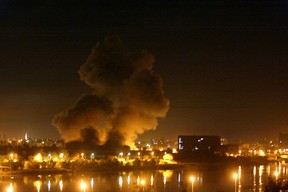 Suzanne Collins has stated that she got the idea for The Hunger Games from flicking through the channels of a television in a hotel room.
Suzanne Collins has stated that she got the idea for The Hunger Games from flicking through the channels of a television in a hotel room.
On one side there was a reality TV show. It disturbed her to see that people could be humiliated for our entertainment.
On another channel, news from the Iraq War was being broadcast. The shock and awe aspects desensitizing viewers from the fact that those were real people, with real thoughts and feelings, and real families around them.
The two disturbing images fused into her imagination and The Hunger Games were born.
With that in mind, it's somewhat missing the point to reduce the whole story arc into a tale about a teenage love triangle. In Mockingjay, that sub-plot really does take a back-seat. We are looking at a much bigger picture than that.
Instead the focus is much more upon what Wilfred Owen called 'war, and the futility of war.'
The arena itself always had been a metaphor for the much wider condition of the Districts, as opposed to the Capitol. In the final novel, the hints are smashed away with a sledgehammer's touch. The reality is presented as something stark, not merely to the viewers in Panem, but to the trilogy's readers too.
While I begrudged the clumsiness with which Collins treated her supporting cast, I did appreciate the realism. Not everyone could make it out of such situations alive and sane.
I also thought it right that a single teenage girl, no matter how symbolically important, would not be present at every major event. That would not have happened in the context of that world, nor did Collins force it to happen in her story.
Unfortunately, it did mean that, as readers seeing through Katniss's eyes, we did miss out on a great deal of the action too. If our eye-witness isn't there, then we don't get to witness it.



 The first two Hunger Games books were always going to be a hard act to follow. I'd been told in advance that Suzanne Collins had pulled it off with aplomb.
The first two Hunger Games books were always going to be a hard act to follow. I'd been told in advance that Suzanne Collins had pulled it off with aplomb.

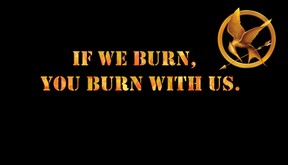 The great supporting cast pretty much merged into an homogeneous blob. We get more details about them, but they're like flakes of gold in a pan of iron pyrite.
The great supporting cast pretty much merged into an homogeneous blob. We get more details about them, but they're like flakes of gold in a pan of iron pyrite.

 Suzanne Collins has stated that she got the idea for The Hunger Games from flicking through the channels of a television in a hotel room.
Suzanne Collins has stated that she got the idea for The Hunger Games from flicking through the channels of a television in a hotel room.



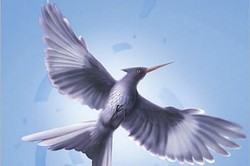

 St Tydecho's Churches in West Waleson 09/03/2014
St Tydecho's Churches in West Waleson 09/03/2014
 Goodies for an Outlander Premiere Partyon 03/06/2015
Goodies for an Outlander Premiere Partyon 03/06/2015
 Holocaust Memorial Day Interview with Rainer Höss, Grandson of Rudolf Architect of Auschwitzon 01/24/2015
Holocaust Memorial Day Interview with Rainer Höss, Grandson of Rudolf Architect of Auschwitzon 01/24/2015
 Romantic Valentine Gifts for an Outlander Fanon 01/16/2015
Romantic Valentine Gifts for an Outlander Fanon 01/16/2015

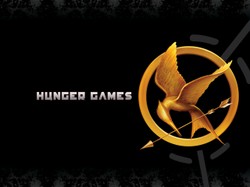
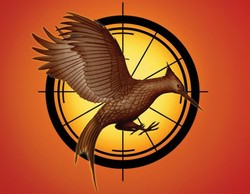
Comments
Peppermint latte is also a winner!
Cheated! Yes, that's a really good word for it. It wasn't a good time to be looking through Katniss's eyes. In fact, it made it clear that we were looking through her eyes and that broke the fourth wall somewhat.
Me too! I'd be more than OK with that - or there's always your peppermint latte ;)
I can also see what she was trying to do and appreciate the angle she took, but I still felt cheated jumping from action to "what, it's over already?! Whaaa?"
I love how I'm following you around these books, discussing them with you via comments. I'd so love to be sitting on your deck, chatting about them over a nice glass of pomegranate wine.
I can see the literary device that Collins was going for. We don't know all that's going on in any given situation. That's made obvious here. It does make us also want to see things from different angles, which is always good.
But in terms of story-telling, I thought that device left a lot to be desired.
I'm right there with you. The putting aside of Katniss is a great way to put it because there's a lot we miss as her paranoia and variety of other issues kick in and absolutely miss out on the other incredibly rich variety of supporting characters find their way around - made me want to know them more for sure and to have entire major things happen when Katniss is blacked out did sort of piss me off. I wanted to SEE these things happen....but no go. Still a good book, but the first two together made the trilogy work for me.